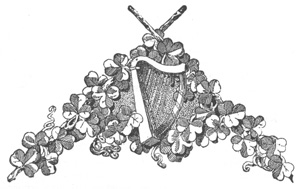The Irish Harpers in Belfast in 1792

BY ROBERT YOUNG, J.P., C.E.
From The Ulster Journal of Archaeology, Second Series, Volume 1, Number 2, 1895

OW that the Ulster Journal of Archaeology is making a fresh start, and that its conductors promise that the claims of our native music will not be forgotten, it seems to be not an unsuitable opportunity to let its readers know how the ancient melodies of Ireland were rescued from the oblivion towards which they were fast hastening, and the conspicuous part taken in this patriotic work by a number of our townsmen near the end of the last century.
Whilst it might not be strictly accurate to assume that the ultimate fate of Irish music was then dependent on the preservation of the melodies composed for the harp—for there were a considerable number of tunes composed and only suitable for the bagpipe, not to speak of the old lullabies and labour songs for the voice alone—yet it would appear that this was practically the way the matter was looked on here about one hundred years ago.
At that period our town only numbered some 18,000 inhabitants, but it was a focus of intellectual life and progress in Ireland; and whilst several important movements had their beginnings here, it may be fairly questioned (at least by musicians) whether the assemblage of the Irish Harpers in Belfast had not as far-reaching, beneficial, and lasting results as any of the political movements begun here at that eventful period in our history.
But the credit of originating this movement must not, in all fairness, be claimed for Belfast. Sir Robert Stewart tells us that so early as 1730 “Contentions of the Bards” were held at Bruree, Co. Limerick, under the presidency of the Rev. Charles Bunworth, himself a performer of merit. He was Crofton Croker’s great grandfather, and his harp was preserved in Croker’s Museum at Rosamond’s Bower, Fulham. Nothing practical, however, seems to have followed these efforts to preserve the native music.
The honour of making the next movement is due to James Dungan, a native of Granard, in County Longford. He was an enthusiastic lover of his native music, and having acquired an ample fortune in Copenhagen, conceived the idea of having annual festivals to promote the cultivation of music and revive the practice of the Harp, intending to encourage the skilful by giving liberal premiums for excellence.
The first meeting was held in Granard in 1781, but only seven Harpers attended. Charles Fanning gained first prize of ten guineas for playing the “Coolin,” O’Neill the second prize of eight guineas for the “Green Woods of Truagh,” and Rose Mooney the third for “Planxty Burke.”
The proceedings were wound up by a ball, at which 500 attended.
James Dungan did not come over on this occasion, but defrayed all expenses. Next year another meeting was held, which was better attended both by the Harpers and the public. Dungan himself was present, but, for some reason which cannot now be ascertained, ceased to take any further part in these gatherings.
However, there was a third meeting, at which Lord and Lady Longford and the county gentry were present, and handsome presents were made to all the Harpers, whether successful or not, so that general satisfaction prevailed.
